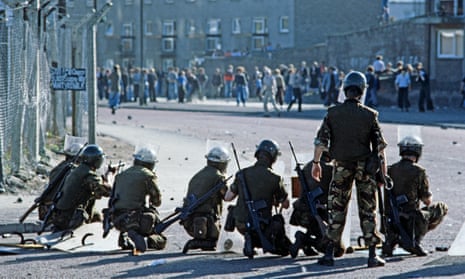Because the Ulster crisis is so intransigent, we often fail to see the wood for the trees. But there is one sharp, uncomfortable and tragic fact that no citizen of the United Kingdom or the Irish Republic should forget. It is that what began, more than eight years ago now, as a campaign to achieve fuller civil rights in Northern Ireland has culminated in the loss of the greatest civil right of all – the right to freedom from murder.
We must not allow our capacity for human horror and pity to be calloused. The past week has been particularly horrible. It is possible to produce statistics to show that violence is not so bad as in previous years, but the facts are nastier than the statistics:
A boy of 12, waiting for the school bus in his village street, sees his father, a part-time soldier, shot dead by the IRA (who also wounded his Catholic workmate). A Catholic in Belfast, accompanied by his 10-year-old son, decides to visit friends in a Protestant area; the father is killed, the son injured, presumably by Protestant extremists. In Fermanagh, an 18-year-old policeman becomes the Royal Ulster Constabulary’s hundredth and youngest victim. An English businessman, on a one-day visit to Belfast, to help provide jobs for West Belfast Catholics, is murdered; and the IRA say, No, they didn’t get the wrong man; so his widow is left to explain to a weeping nine-year-old why his father died.
There is no sane explanation. We do well to remind ourselves of that.
Key quote
‘In the mixed economy, it’s the mix that counts’
Margaret Thatcher
Talking point
Leprosy is becoming resistant to drugs that have treated it successfully for 30 years, and Dr Stanley Browne, director of London’s Leprosy Study Centre, believes the outlook is ‘very serious’: ‘Dapsone has been an effective treatment for leprosy since 1946,’ he said. ‘But if you treat a chronic disease with just one drug, that disease will develop resistant strains.’
Leprosy beats the drugs, News
